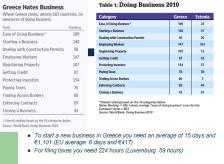It’s no secret that I think we have too many government bureaucrats and I’ve shared very strong evidence that most of them are grossly overpaid.
I also have shown some data suggesting that they don’t work very hard, though I confess to mixed feelings about that factoid since I’d rather have some bureaucrats goofing off all day. After all, the economy would be even more burdened if they were being zealous and harassing additional people in the economy’s productive sector.
After all, the economy would be even more burdened if they were being zealous and harassing additional people in the economy’s productive sector.
As an economist, one of my broad concerns is that taxpayers are picking up the tab for bloated bureaucracy. But I’m also worried for another big reason. We get less prosperity when too many people are being lured into government jobs. Simply stated, those people could be contributing to economic output if they instead were employed in the private sector.
In other words, our living standards depend on how productively we utilize labor and capital.
But we need to be careful about how we define “private sector.”
Why? Because not all private jobs are created equal. There are millions of government contractors, for instance, and many of those people should beconsidered part of a “shadow bureaucracy.” Too often, they’re doing things that are just as wasteful and inefficient as their bureaucrat counterparts, but they don’t show up in the Labor Department data as part of the government workforce.
Another example of the wrong kind of private employment is the so-called compliance sector.
Here are some excerpts from a report in The Hill about “compliance officers” hired by private companies.
A growing thicket of federal regulations under the Obama administration has contributed to an employment spike in at least one corner of the job market: the increasingly vital compliance industry. ObamaCare, the Dodd-Frank Act and other large federal undertakings have led to an outpouring of new agency rules derided by business groups and defended by advocates. But the regulations have also been a boon for professional compliance officers paid to help companies understand and adapt to the new requirements. …Data kept by the Bureau of Labor Statistics (BLS) shows an 18-percent increase in the number of compliance officers in the United States between 2009 and 2012.
Recommended
The article continues, including data showing that the compliance sector is getting bigger, costing lots of money, and that the problem began before Obama took office.
At last count, there were an estimated 227,500 compliance officers employed in the United States, according to the BLS. The bureau defines a compliance officer as an employee responsible for evaluating conformity with laws and regulations. …Compliance officers make an average of just under $65,000 annually, a gross national labor cost of roughly $14.7 billion, according to the BLS data. …for small firms without the resources to hire their own full-time compliance staff, adapting to new regulations can be an expensive proposition, said Sam Batkins, director of regulatory policy for AAF. …The expansion of the compliance industry did not begin under President Obama and is not solely linked to the healthcare and Wall Street reform bills. The AAF analysis found a 122-percent increase of compliance officers over the past 10 years.
Gee, maybe we can get to the point where our entire economy is nothing but government bureaucrats and compliance officers. With enough of both categories, we could have full employment!
Of course, there would be one tiny little problem since nothing would get produced. And with nobody generating any income, there wouldn’t be any money to pay for the paper pushers from both government and the private sector.
 But as we’ve seen from nations such as Greece, politicians generally don’t grasp this simple point until it’s too late.
But as we’ve seen from nations such as Greece, politicians generally don’t grasp this simple point until it’s too late.
Though let’s give a shout out to the former left-wing President of Brazil, who irritated his socialist supporters by making a seemingly elementary observation that you have to have production before you can have redistribution. Heck, even rock stars are beginning to realize that capitalism is the right approach if you want better lives for the less fortunate.
So maybe there’s hope.
Let’s close by issuing a couple of important caveats. Notwithstanding my occasionally overheated rhetoric, not all government jobs are bad jobs. Similarly, I don’t want to imply that all compliance jobs in the private sector are wasteful and inefficient.
To be more specific, I mean those statements in the narrow sense that companies doubtlessly are trying to adapt to all the new regulatory burdens in the least costly manner possible. So the jobs they are creating make sense, given the reality that firms are being buried under a blizzard of red tape.
But I also mean it in the broad sense that there are some regulations that pass a cost-benefit test, and compliance officers resulting from those regulations presumably are part of such calculations. Even a cranky libertarian like me, for instance, won’t lose sleep about compliance officers in a nuclear power plant or at a medical lab doing research on the Ebola virus.*
*But allow me to point out that a genuinely free market would have something akin to compliance officers because of “private regulation.” As I explained last year, “the profit motive creates mutually reinforcing oversight,” and we can be quite confident that market forces would do a better job of protecting us at lower cost.

























Join the conversation as a VIP Member